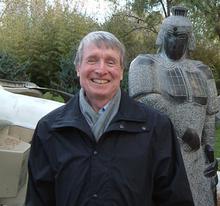约翰·霍兰德 John H Holland
基本信息
| 类别 | 信息 |
|---|---|
| 出生时间 | 1929-02-02 |
| 逝世时间 | 2015-08-09 |
| 国籍: | 美国 |
| 母校: | 密歇根大学、麻省理工学院 |
| 成就: | 开创遗传算法研究 |
| 主要研究方向: | 遗传算法、复杂适应系统、心理学 |
| 博士生导师: | 亚瑟·巴克斯 |
| 博士学生 | 梅拉妮·米歇尔、埃德加·科德 |
约翰·霍兰德(1929-2015)是美国科学家,安娜堡密歇根大学的电气工程与计算机科学教授,兼心理学教授,同时他还是遗传算法的研究先驱。
生平
霍兰德在1929年生于美国印第安纳州的Fort Wayne。他在麻省理工学院学习物理学,并在1950年获得学士学位,然后又求学于密歇根大学,分别于1954年和1959年获得数学硕士和计算机博士学位(这是世界是第一个计算机博士学位)。[1]霍兰德之后担任了密歇根大学的电气工程与计算机科学教授,兼心理学教授。此外,他还是罗兰德科学研究所和卑尔根大学的访问学者。
霍兰德还担任圣塔菲研究所的董事会亦即科学指导委员会成员,同时也是世界经济论坛的成员。[2]
霍兰德在1961年获授富兰克林研究所的Louis E. Levy奖,还在1992年被授予麦克阿瑟天才奖。[3][4]
2015年8月9日,霍兰德在密歇根安娜堡与世长辞。[5]
研究领域
霍兰德频繁地在世界各地讲授他自己的研究、亦即解释关于复杂适应系统(CAS)研究的的各种开放问题。在1975年,他写下了遗传算法的开创性著作《自然于人工系统的适应性v(Adaptation in Natural and Artificial Systems)》,还建立了霍兰德模式理论。
主要文章及著作
霍兰德写过的书包括但不限于:
- Adaptation in Natural and Artificial Systems (1975, MIT Press)
- Hidden Order: How Adaptation Builds Complexity (1995, Basic Books)
- Emergence: From Chaos to Order (1998, Basic Books)
- Signals and Boundaries: Building Blocks for Complex Adaptive Systems (2012, MIT Press)
- Complexity: A Very Short Introduction (2014, Oxford University Press)
霍兰德参与撰写的文章(部分):
- "A universal computer capable of executing an arbitrary number of subprograms simultaneously", in: Proc. Eastern Joint Comp. Conf. (1959), pp. 108–112
- "Iterative circuit computers", in: Proc. Western Joint Comp. Conf. (1960), pp. 259–265
- "Outline for a logical theory of adaptive systems", in: JACM, Vol 9 (1962), no. 3, pp. 279–314
- "Hierarchical descriptions, universal spaces, and adaptive systems", in: Arthur W. Burks, editor. Essays on Cellular Automata (1970). University of Illinois Press
- "Using Classifier Systems to Study Adaptive Nonlinear Networks", in: Daniel L. Stein, editor. Lectures in the Sciences of Complexity (1989). Addison Wesley
- "Concerning the Emergence of Tag-Mediated Lookahead in Classifier Systems", in: Stephanie Forrest, editor. Emergent Computation: self-organizing, collective, and cooperative phenomena in natural and computing networks (1990). MIT Press
- "The Royal Road for Genetic Algorithms: Fitness Landscapes and GA Performance", in: Francisco J. Varela, Paul Bourgine, editors. Toward a Practice of Autonomous Systems: proceedings of the first European conference on Artificial Life (1992). MIT Press
- "Echoing Emergence: objectives, rough definitions, and speculations for ECHO-class models", in: George A. Cowan, David Pines, David Meltzer, editors. Complexity: metaphors, models, and reality (1994), Addison-Wesley
- "Can There Be A Unified Theory of Complex Adaptive Systems?", in: Harold J. Morowitz, Jerome L. Singer, editors. The Mind, The Brain, and Complex Adaptive Systems (1995). Addison-Wesley
- "Board Games", in: John Brockman, editor. The Greatest Inventions of the Past 2000 Years (2000). Phoenix
- "What is to Come and How to Predict It.", in: John Brockman, editor. The Next Fifty Years: science in the first half of the twenty-first century (2002). Weidenfeld & Nicolson
相关链接
编者推荐
视频
书籍推荐
《涌现》(从混沌到有序,涌现理论奠基人、遗传算法之父约翰•霍兰德关于涌现现象研究的奠基之作,复杂科学领域里程碑式著作) (Chinese Edition)
一粒小小的种子为何能够长成红杉、雏菊、豆苗等独特的植物?蚂蚁个体的行为非常机械,为何蚁群却展现出非凡的灵活性?国际象棋只有二十几条规则,为何人们能不断发现新的走法?机器为何能够越人类在制造它时赋予它的能力?
上述现象揭示了这样一个规律,即复杂的事物是由小而简单的事物发展而来的,而这正是涌现现象的特征。涌现现象产生的根本原因在于,事物各组成部分之间相互作用产生的复杂性,远非个体行为的叠加可以相比,也就是我们常说的“整体大于部分之和”。
“整体大于部分之和”这一特性也成为涌现研究道路上的阻碍。许多哲学家和一些科学家坚定地认为对涌现的研究不可能还原为对明确定义的机制及其相互作用的研究。他们认为,机器的能力不可能超越人类在制造它时赋予它的能力。复杂自适应系统理论提出者约翰•霍兰德借助模型和还原思想,建立了研究涌现现象的普适框架,扫清了研究道路上的障碍,推动了复杂自适应系统、机器学习、人工智能等领域的长足发展。
你可能会认为,涌现现象只出现在特定的系统中,在日常生活中并不常见。但实际上,具有涌现现象的系统随处可见且与我们息息相关,比如神经元网络系统、人体免疫系统、互联网和全球经济系统等。因此,研究涌现现象具有重要的现实意义。凭借霍兰德提出的普适理论框架,我们可以找出某些复杂现象背后的根本规律,从而更好地认识世界、开拓世界以及预测未来。
参考链接
- ↑ "Archived copy". Archived from the original on September 11, 2008. Retrieved March 2, 2008.
{{cite web}}: CS1 maint: archived copy as title (link) - ↑ "Profile: John H. Holland". Santa Fe Institute. Archived from the original on February 2, 2013.
- ↑ "Franklin Laureate Database - Louis E. Levy Medal Laureates". Franklin Institute. Archived from the original on June 29, 2011. Retrieved January 22, 2011.
- ↑ https://www.macfound.org/fellows/463/
- ↑ Complexity science pioneer John Holland passes away at 86 at santafe.edu

